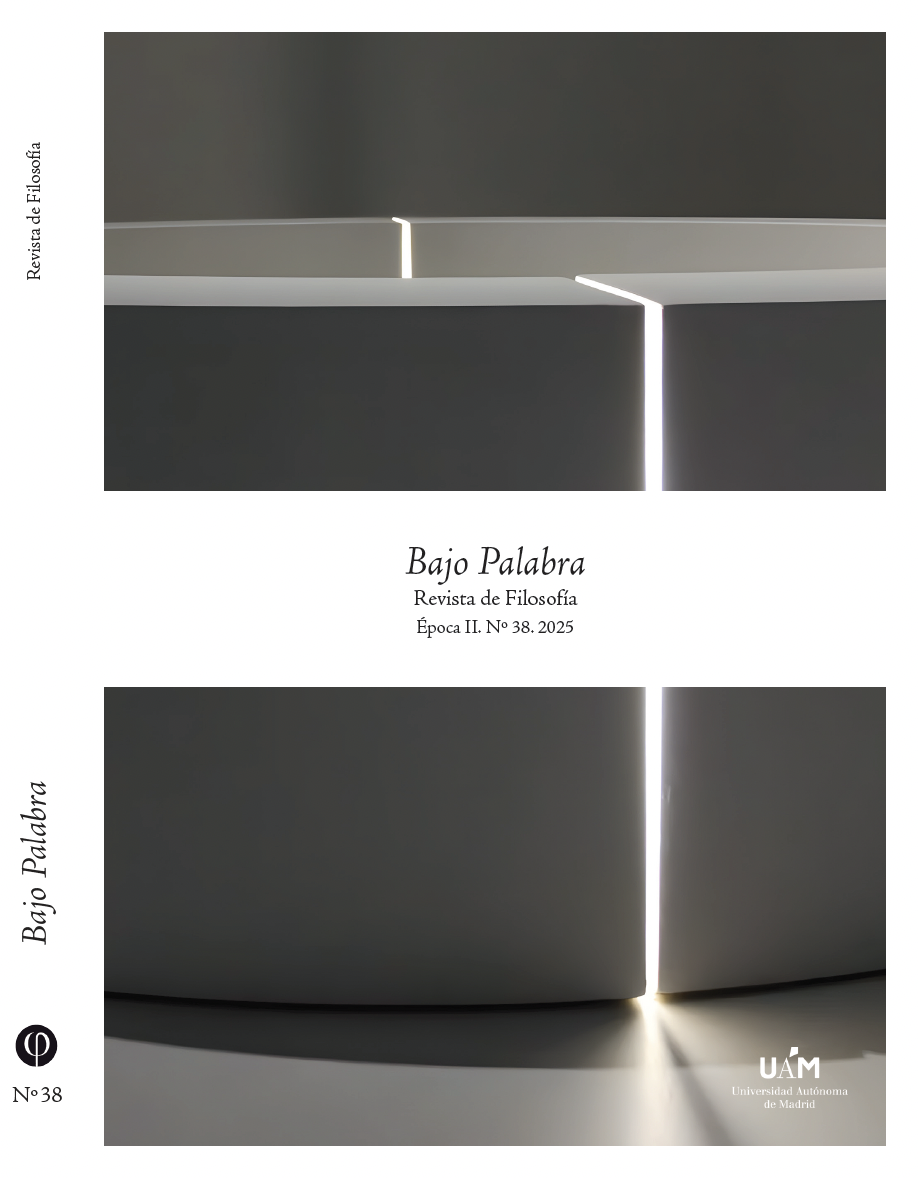Mots-clés :
confines, fallas, representación, reconocimiento, globalización, autoridad(c) Tous droits réservés Hans Lindahl 2025

Cette œuvre est sous licence Creative Commons Attribution 4.0 International.
Résumé
La resistencia prolongada y enconada de los movimientos altermundistas
y antiglobalización en todo el mundo
demuestra que la globalización del derecho se traduce en la globalización de la
inclusión y la exclusión. La humanidad
está dentro y fuera del derecho global
en todas sus posibles manifestaciones.
¿Cómo es posible? Conceptualmente:
¿cómo deben estructurarse los ordenamientos jurídicos de modo que, aunque
ahora podamos hablar de derecho más
allá de las fronteras estatales, no sea posible ningún ordenamiento jurídico global
emergente que pueda incluir sin excluir?
Desde el punto de vista normativo: ¿es
posible una política autoritativa de los
confines que ni postule la posibilidad de
realizar un ordenamiento jurídico global
que incluya a todos ni acepte la resignación o la parálisis ante la globalización de
la inclusión y la exclusión?.
Téléchargements
Références
Bedorf, Thomas, Verkennende Anerkennung: Über Identität und Politik, Frankfurt, Suhrkamp, 2010.
Branch, Jordan, The Cartographic State: Maps, Territory, and the Origins of Sovereignty, Cambridge, Cambridge University Press, 2014.
Castells, Manuel, La era de la información, vol. 1: La sociedad red, 6ta. edición en
español, México, Siglo Veintiuno Editores, 2005.
Castoriadis, Cornelius, Philosophy, Politics, Autonomy, editado por David Ames
Curtis, Oxford, Oxford University Press, 1991.
Derrida, Jacques, La escritura y la diferencia, traducción de Patricio Peñalver,
Barcelona, Editorial Anthropos, 1989.
Dorf, Michael C. y Sabel, Charles F., “A Constitution of Democratic Experimentalism”, Columbia Law Review, 98 (1998) 2, pp. 267 y ss.
Drumbl, Mark A., Atrocity, Punishment and International Law, Cambridge,
Cambridge University Press, 2007.
Gilbert, Margaret, On Social Facts, Princeton, Princeton University Press, 1992.
Goodman, Nelson, Los lenguajes del arte. Una aproximación a la teoría de símbolos, Buenos Aires, Paidós, 2010.
Habermas, Jürgen, La inclusión del otro: estudios de teoría política, traducción de
Juan Carlos Velasco Arroyo y Gerard Vilar Roca, Barcelona, Paidós, 1999.
Habermas, Jürgen, The Postnational Constellation, traducción de Max Pensky,
Cambridge, Polity Press, 2001.
Handl, Günther, Zekoll, Joachim y Zumbansen, Peer (redactores), Beyond Territoriality: Transnational Legal Authority in an Age of Globalization, Leiden, Brill,
Hughes, Carys, “Action Between the Legal and the Illegal: A-Legality as a Political-Legal Strategy”, Social & Legal Studies, 27 (2018) 4, pp. 470-492.
Laclau, Ernesto y Mouffe, Chantal, Hegemonía y estrategia socialista: Hacia una
radicalización de la democracia, Madrid, Siglo XXI, 1987.
Lefort, Claude, Essais sur le politique (XIXe-XXe siècles), París, Éditions du Seuil,
Levinas, Emmanuel y Kearney, Richard, “Dialogue with Emmanuel Levinas”,
en Cohen, Richard A. (redactor), Face to Face with Levinas, Stony Brook, State
University of New York Press, 1986.
Lindahl, Hans, “Intentionality, Representation, Recognition: Phenomenology
and the Politics of A-Legality”, in Thomas Bedorf and Steffen Herrmann (eds.),
Political Phenomenology. Experience, Ontology, Episteme, Abingdon, Routledge,
, pp. 256-276.
Lindahl, Hans, “Inside and Outside Global Law: The Julius Stone Address
”, Sydney Law Review, 41 (2019), pp. 1-34.
Lindahl, Hans, Authority and the Globalisation of Inclusion and Exclusion, Cambridge, Cambridge University Press, 2018.
Lindahl, Hans, Fallas de la globalización: orden jurídico y política de la a-juridicidad, traducción de Jorge Restrepo Ramos, Bogotá, Siglo del Hombre, 2018.
Lindahl, Hans, “Possibility, Actuality, Rupture: Constituent Power and the Ontology of Change”, Constellations, 22 (2015) 2, pp. 163-174.
Lindahl, Hans, Fault Lines of Globalization: Legal Order and the Politics of A-Legality, Oxford, Oxford University Press, 2013.
Lindahl, Hans, “Recognition as Domination: Constitutionalism, Reciprocity
and the Problem of Singularity”, en Walker, Neil, Shaw, Jo y Tierney, Stephen
(eds.), Europe’s Constitutional Mosaic, Oxford, Hart Publishing, 2011, pp. 205-
Lindahl, Hans, “Discretion and Public Policy: Timing the Unity and Divergence
of Legal Orders”, Prechal, Sacha y Van Roermund, Bert (eds.), The Coherence of
EU Law: The Search for Unity in Divergent Concepts, Oxford, Oxford University
Press, 2008, pp. 291-314.
Liu Institute for Global Issues, Gulu District NGO Forum y Ker Kwaro Acholi, Roco Wat I Acoli: Restoring Relationships in Acholi-Land - Traditional Approaches to Justice and Reintegration, (2005) 14, <https://sppga.ubc.ca/wp-content/
uploads/sites/5/2016/03/15Sept2005_ Roco_Wat_I_Acoli.pdf>.
Menga, Ferdinando, Ausdruck, Mitwelt, Ordnung: Zur Ursprünglichkeit einer
Dimension des Politischen im Anschluss an die Philosophie des frühen Heidegger,
Munich, Wilhelm Fink, 2018.
Menga, Ferdinando G, “Was sich der Globalisierung entzieht. Die unaufhebbare Kontingenz bei der Stiftung von Weltordnungen”, Koch, Dietmar, Ruppert,
Michael y Weidtmann (redactores), Globalisierung — Eine Welt?, Tubinga, Attempto-Verlag, 2015, pp. 64-73.
Merleau-Ponty, Maurice, Le visible et l’invisible, París, Gallimard, 1964.
Michaels, Ralf, “Global Legal Pluralism”, Annual Review of Law and Social
Science, (2009) 5, pp. 243-262.
Moore, Margaret, A Political Theory of Territory, Oxford University Press, 2015.
Mouffe, Chantal, En torno a lo político, traducción de Soledad Laclau, México,
Fondo de Cultura Económica, 2007.
Nouwen, Sarah y Werner, Wouter, “Monopolizing Global Justice: International
Law as Challenge to Human Diversity”, Journal of International Criminal Justice,
(2015) 1, pp. 157–176.
Plessner, Helmuth, Los grados de lo orgánico y el hombre: Introducción a la antropología filosófica, Granada, Universidad de Granada, 2022.
Pollack, Mark A. y Schaffer, Gregory C., When Cooperation Fails: The International Law and Politics of Genetically Modified Foods, Oxford, Oxford University
Press, 2009.
Rancière, Jacques, El odio a la democracia, Buenos Aires, Amorrortu, 2013.
Ricœur, Paul, Caminos del Reconocimiento. Tres estudios, traducción de Agustín
Neira, México, Fondo de Cultura Económica, 2006.
Santos, Boaventura de Sousa, Toward a New Legal Common Sense: Law, Globalization, and Emancipation, Cambridge, Cambridge University Press, 2020, 2002.
Sassen, Saskia, Expulsiones: Brutalidad y complejidad en la economía global, Madrid, Katz Barpal Editores, 2015.
Schiff Berman, Paul, Global Legal Pluralism: A Jurisprudence of Law Beyond Borders,Cambridge, Cambridge University Press, 2012.
Sitrin, Marina y Assellini, Dario, They Can’t Represent Us! Democracy from Greece
to Occupy, Londres, Verso, 2014.
Twining, William, General Jurisprudence: Understanding Law from a Global Perspective, Cambridge, Cambridge University Press, 2009.
Van Fraassen, Bas, Scientific Representation: Paradoxes of Perspective, Oxford, Clarendon Press, 2008.
Waldenfels, Bernhard, Verfremdung der Moderne: Phänomenologische Grenzgänge, Gotinga, Wallstein Verlag, 2001.
Waldenfels, Bernhard, Order in the Twilight, traducción de David J. Parent, Columbus, Ohio University Press, 1996.

